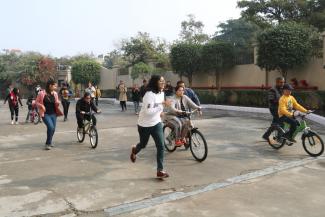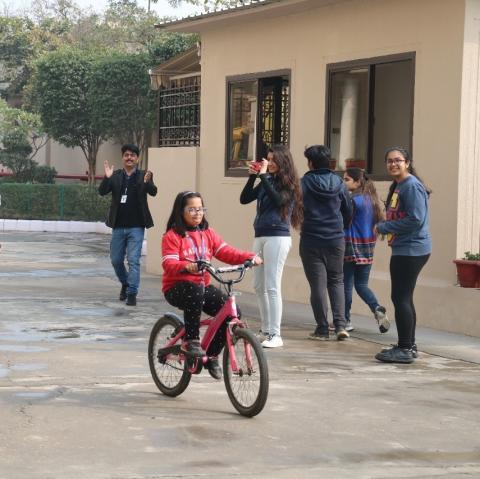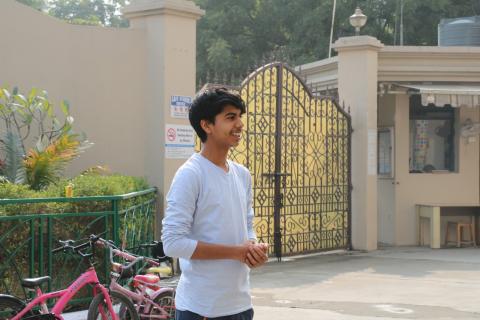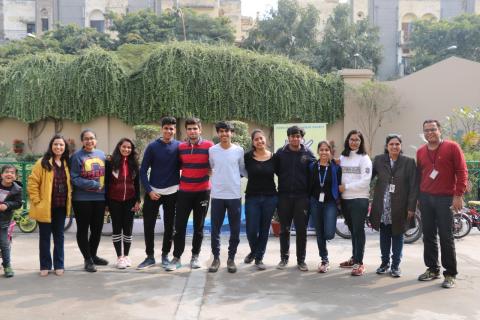
A special cycling camp for children with Down syndrome brought in loads of fun, learning and togetherness for the participants as well as the young volunteers. Interview with Deepa Garwa, Secretary, Delhi Down Syndrome Parents Society and blogger, and her son, Aaryamann, who meticulously organized the 5-day camp.
Deepa, you held a cycling camp for children with Down syndrome recently. Please could you tell us something about it?
Seeing my daughter, Aarshia, cycling independently was a very special moment for all of us. It did take a lot of time and energy for us to teach her. We went through many trial and errors for almost a month and had figured out a better way at the end of it, but as they say hindsight is always 20/20.

Aarshia cycling independently and a bunch of young teenagers in the background
One day after she came back from cycling and was chirping like a bird, my son, Aaryamann, asked me if we can do it for other children. My husband and I looked at each other and decided to give it a go. The next day, we all sat, made a tentative plan and asked Aaryamann to take it ahead. The biggest push came from Dr. Rekha Ramachandran, President of the Down Syndrome Association of India who, after speaking to Aaryamann, liked the idea instantly and gave him her full support. Her coming on board made everything so smooth.
The cycling camp was for 5 days. We chose to have only 10 children since this was going to be our first camp and we wanted to give personal attention to each one. We went from making the children comfortable with the cycle weight, balancing, scooting with alternate legs, scooting with both legs simultaneously and then holding them and running so they balance the handle and then finally letting them go.
What was the initiative trying to address?
As I mentioned earlier, it came after we all saw how happy cycling made Aarshia. And we wanted to address the common perception or misconception that many children with Down syndrome are not able to cycle without support wheels.
Tell us about Aaryamann’s and how did he rope in the volunteers for the camp?
Aaryamann is 17 and is studying in Grade 11 in The Heritage School, Rohini. He is a football fan and his favourite subjects are Maths and computer science. He loves to listen to music and code in his free time. He dotes on his sister, Aarshia, who has Down syndrome and loves to play badminton and shooting games with her.
All the volunteers who came for the camp were his friends and none of them had ever interacted with someone with special needs. He proposed to some of his classmates about this initiative and almost instantly got volunteers. The volunteers thoroughly enjoyed the whole process and learned many things about children with Down syndrome. Almost all of them were happily surprised at the fun loving and social nature of our children.
I would also like to thank Mr. Vishnu Karthik and The Heritage School, Rohini, for providing us with the space. A space without traffic and strays.
This camp not only taught cycling to children, but it also spread awareness amongst those who didn't know anything about special needs.
What was the response to the camp? How many children learnt cycling?
The result was beyond our expectations! We had secretly wanted to but never thought we will achieve 100 percent result. In fact we achieved 120% because we also taught two siblings within this camp.
Look at the video at the end of the article for a parent's response.
Aaryamann’s responses:

Aaryamann standing and talking with bikes lined up behind him
Aaryamann, what did you feel after you initiated the camp?
Initially, I wasn’t too anxious, just a little nervous. According to me, it was going to be a simple and fun camp. And then, it was the night of 1st January, a day before the camp, that my head really put things into perspective. I, alongside a group of 8 volunteers, would be teaching about 10 children with Down syndrome how to cycle. I was spearheading an event that would teach these children a skill in five days that parents have been trying to for years. It was a nerve wracking thought, one that made me nervous every day of the camp, but also provided me the motivation to keep working to achieve that goal. I felt responsible, there’s no better word for it. I felt the weight of the expectations of the kids and the parents and the volunteers, and it was slightly stressful, but nevertheless, it carried me the entire week the camp was on.
What were the biggest challenges you faced during the camp?
Thankfully, the camp didn’t run into any major issues. However, that being said, we certainly felt the presence of a professional mechanic or someone well versed with cycles was vital. The bikes had to be constantly adjusted: their heights were being tweaked with, their pedals were to be removed and later put back on, and the brakes were to be fixed. The alterations there took us a considerable amount of time, and hampered the pace and the learning. One mother had to have her child’s bike changed thrice throughout the camp, multiple factors contributing to that. Thus, if I was to have a similar camp, I’d prefer having a professional around to help with the adjustments.
Would you organize a similar camp again in furture?
Definitely. Everyone, from the children to the parents, to the teachers working at the school to the guards on duty there to the parents of the volunteers - everyone loved the event. It brought about smiles on countless faces, it brought the community closer. I got a lot of appreciation and love from Dr. Rekha, the president of Down Syndrome Federation of India (DSFI) and also from Down Syndrome Parents Society (DSPS) – Delhi. I’ve never been more proud of anything than I have been of this camp. There’s not a shadow of doubt when I say that I’d love to do this all over again.
Is there anything that you would like to do differently for the next camp?
The camp emphasized and focused on one-on-one attention with the students. The volunteers were all assigned who they were working with, and that contributed heavily to the camp’s success. However, we did overlook the advantages of activities that involved the entire groups. On the fourth day, we had races between the kids, and a parade where every student on the bike was cheered on by the audience. All of these were key in maintaining the joyful atmosphere and boosted the morale and confidence for the children, so the next time we have the camp, we’d devote more time and attention to certain activities involving the group as a whole.
How should somebody who wants to replicate this in another city go about it?
I believe the three factors that proved to be the most vital throughout the event were the atmosphere, the involvement of our volunteers and our well drafted strategy/plan for each day. Also the support from Down Syndrome Federation of India (DSFI),was pivotal for the camp. Every day before starting the session, all volunteers, along with my parents, used to gather and discuss the flow of the day, which child should go from stage 1 to the next and so on. So planning meticulously helped us achieve our goal really fast. When it’s just one child learning all by himself, it’s easy to get demotivated when you fall over.
But at a camp like this, with volunteers to help you out and other children performing well (and also tumbling over with you), the atmosphere contributes and helps immensely and keep up their spirit.

The volunteers in the picture above with Deepa and Avinash - Aarshia and Aaryamann's parents
The volunteers were incredibly important to this event’s success. We had eight 16 year olds who were sprinting along with the kids and talking to them and cheering them on and making sure they never gave up. These volunteers were so invested into the project, it was beautiful. They’d be suggesting strategies and methods to optimize the teaching, they’d finish their food early to get back to the students as soon as they could. By the end of the camp, the parents of the children all hugged the volunteers: they had spent the 5 days alternating between being a marathon runner, a passionate coach and a caring friend.
The above three factors, I feel were key to the success of this camp.
The volunteers without whom this would not have been possible are:
Aaryamann Singh, Vanshika Makkar, Sanah Arora, Mannat Kakkar, Kanish Khanna, Nikita Sagar, Sanaa Chawla, Kanishk Bansal, Vedansh Aggarwal
Raising The Bar: A film by Onir on young people with Down Syndrome dancing to celebrate universality of love and acceptance






